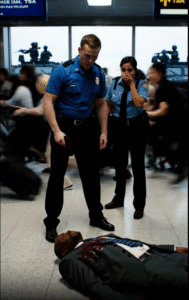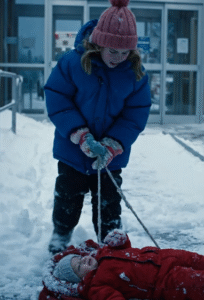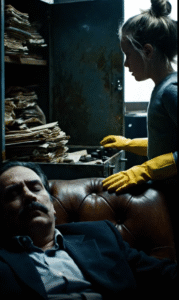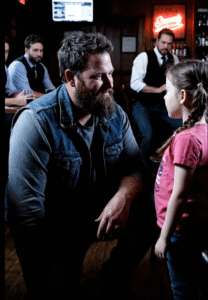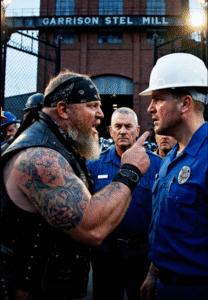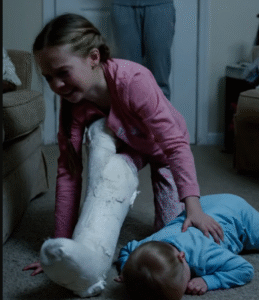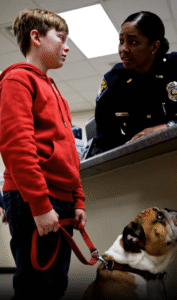Clara’s story spilled out of her, a torrent of memory held back for decades. She told me about St. Vincent’s Orphanage, an hour upstate. A place of gray walls and cold floors. She was an orphan; he was a mystery.
“They called him Daniel,” she said, her voice barely a whisper, her eyes fixed on the portrait of Lucas. “He showed up when he was six. The nuns said his adoptive parents died in a car crash.”
“Adoptive parents?” My mind raced. The police report, the file I had memorized, said only missing, presumed abducted.
“He hated the name Daniel,” Clara continued, wringing her hands. “He told everyone his name was Lucas. He said he had a big house with a huge garden, and a grand piano. He said his big brother called him ‘Champ’.”
A cold shock went down my spine. That was it. That was my name for him. Champ. No one else knew that. Not the police, not the papers. It was our word.
“We thought he was making it up, sir. Kids do that… invent a fantasy to escape. The other kids were cruel. They teased him for his ‘fantasy palace.’ But I… I believed him. He was different. He was so… sad.”
I grabbed the phone and called my head of security, a former FBI agent named Harrison. “Get the car. We’re going upstate. And get a team. I want everything you can find on a St. Vincent’s Orphanage. Now.”
I looked at Clara. “You’re coming with me.”
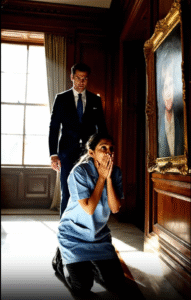
The drive was silent, suffocating. I was vibrating with a terrifying mixture of hope and pure, unadulterated rage. If he was there, that close, all this time… The lives my parents lost to grief. The life I lost to this obsession.
St. Vincent’s was a crumbling brick relic, smelling of dust and forgotten prayers. An elderly nun, Sister Margaret, met us. She was frail, her eyes holding the history of the place.
Harrison’s team was already there, pulling files.
I showed her the portrait on my phone.
She paled. “My goodness. That’s… that’s little Daniel.”
“What do you know about him?” I demanded, my voice too sharp.
Clara put a gentle hand on my arm. “Please, Sister. It’s important.”
The nun led us to a damp archive room. She pulled a dusty ledger. “Daniel. Yes. He arrived in 1995. Brought in by a woman from Social Services. Here are the papers.”
Harrison took them. He looked at them for less than ten seconds. “These are fakes, Mr. Monroe. Good fakes, but fakes. The birth certificate is counterfeit. The social worker… she never existed.”
My blood ran cold. This wasn’t a tragedy. This was a conspiracy.
“He was a sweet boy,” Sister Margaret said, oblivious to the legal implications. “But troubled. Always drawing. He drew the same thing, over and over. He said it was his ‘real home’.”
“Did he leave anything?” I asked, my throat tight. “Did he… did he ever run away?”
Clara answered. “He did. When he was 14. After a bad fight with some older boys. He just… vanished. I never saw him again.”
“Wait,” the nun said. She went to a rusted filing cabinet and pulled out a thin folder. “He left this. He told me… ‘If my brother ever comes, give him this. He’ll know it’s me’.”
My hands were shaking so violently I could barely take it from her.
It was a child’s drawing. Crayon on yellowed construction paper.
It was my house. The garden. The grand piano in the living room.
And standing next to it, two boys. One taller, one smaller. Holding hands.
At the bottom, in messy, childish letters, it said: “I AM LUCAS MONROE. MY BROTHER WILL FIND ME.”
I collapsed against the wall. The proof. After 30 years, this was it. He was alive. He remembered.
“He was here,” I whispered, the words choking me. “He was right here.”
Clara was crying silently. “He never gave up, sir. He always said you’d come.”
The drive back was a blur. My guilt had a new, sharper edge. He wasn’t just lost. He was waiting.
For the next two weeks, my life became a war room. Harrison’s team worked 24/7. We now had a name: “Daniel.” We had a timeline. Fled St. Vincent’s at 14. Where does a 14-year-old on his own go?
“He’s in the system,” Harrison said, pointing to a whiteboard covered in notes. “He doesn’t have our name. He’s a ghost.”
We hit dead ends for days. Shelters, juvenile records, nothing. It was like he’d vanished off the face of the earth in 2003.
Then, a breakthrough.
“We got a hit,” Harrison said, bursting into my office at 3 AM. “Facial recognition found a partial match on a shelter intake photo in Albany. 2006.”
I was at his side in a second. The photo was grainy, a 17-year-old kid with a broken arm and a black eye. His face was thinner, harder, but the eyes… they were Lucas’s.
“Name?” I asked.
“Daniel Lucas Menezes,” Harrison said. My mother’s maiden name. Menezes. He’d kept a piece of us.
“The file says he was found injured on a highway,” Harrison read. “Stayed three months, then disappeared again.”
“Keep digging,” I ordered. “He’s leaving a trail.”
The trail went cold again for five more years. And then… another hit. This one was chilling.
“Mr. Monroe,” Harrison said, his voice grave. “A hospital admission. 2012. John Doe, later identified by partial prints as Daniel Lucas Menezes. Age 30. Severe head trauma. Hit and run.”
My heart stopped. “Is he…?”
“He lived. But the report says he suffered significant memory loss. Partial amnesia.”
No. After all this. After he remembered… he was forced to forget again.
We flew to the hospital in Ohio. The doctor, now retired, remembered him.
“We called him ‘The Artist’,” Dr. Evans said. “He couldn’t remember his name, his past, anything. But my God, he could draw. He was quiet, gentle. Always drawing pictures of children. Said it… soothed him.”
“What happened to him?” I asked.
“He was with us for months. One day, he just… walked out. Left this.”
He handed me a piece of paper. It wasn’t a child’s drawing anymore. It was a stunningly detailed sketch.
A grand piano. And two small boys.
“He said he had a dream about this,” the doctor said. “Over and over. He said he had to go ‘home,’ but he didn’t know where it was.”
“Did he say anything else?” Clara asked, her voice trembling.
“Just one thing. He kept mentioning a place. St. Vincent’s. Said he felt… safe there.”
He went back.
We drove to St. Vincent’s immediately. It was no longer a functioning orphanage. It was abandoned, condemned.
We had to cut a chain on the fence. Harrison brought flashlights. The inside was a wreck. Graffiti covered the walls, plaster was falling. It was a tomb.
Clara knew exactly where to go. “The boys’ dorm. This way.”
We walked down a dark hallway, our footsteps echoing. The air was thick with mold.
She pushed open a door. The room was filled with broken bunk beds.
And the walls were covered in drawings. Not just graffiti, but art. Sketches of faces, of trees, of… pianos.
Clara moved her flashlight beam across the wall, and then she gasped, covering her mouth.
I followed the light.
There, scrawled in charcoal, was a large, desperate drawing of the orphanage itself. And beneath it, a sentence that ripped my soul apart.
“I CAME BACK. NO ONE WAS WAITING.”
He had come back. He had come back for us, and we weren’t there. His last beacon of hope, and it was empty.
I sank to my knees. The guilt was suffocating. I had failed him. Over and over.
“This was years ago, Arthur,” Harrison said gently. “We don’t know…”
“Find him,” I choked out. “I don’t care what it costs. Find him.”
The search became frantic. Where does a man with no memory and a talent for art go?
“He’s off the grid,” Harrison reported. “No credit cards, no social security, no driver’s license. He’s living in cash. But a guy this good at art… he’s not hiding it.”
We scoured artist forums, craft fairs, street art blogs. For six weeks, nothing. I was losing hope. I felt him slipping away again.
And then, the call.
“We found him.”
I could barely breathe. “Where?”
“It’s a long shot, but the name… An artist registered for a craft fair in rural Pennsylvania. Sells charcoal portraits of children.”
“What’s the name?”
“Lucas. He’s using the name Lucas Monroe.”
He knew. The amnesia wasn’t total. Or… or he’d found it again.
“Get the jet.”
We arrived in the small town square. It was a beautiful fall afternoon. People were laughing, music was playing. It felt sickeningly normal.
“He’s in booth 42,” Harrison said into his earpiece.
We pushed through the crowd. My heart was a hammer against my ribs.
And then, Clara stopped. She pointed. “Sir…”
I saw him.
He was older. His face was lined with hardship, a short beard covering his jaw. He was wearing simple, worn clothes. He was sitting on a stool, sketching a portrait of a little girl, his head bent in concentration.
It was him.
I couldn’t move. Thirty years. Thirty years of nightmares, of false leads, of empty anniversaries.
Clara stepped forward first, her steps hesitant.
“Daniel?” she whispered.
The man looked up. His eyes… they were the same. They widened in confusion, a flicker of something… recognition?
“I… I know you,” he murmured, his voice rough. “From… from the home?”
“It’s me, Daniel,” Clara said, tears streaming down her face. “It’s Clara.”
He stood up, dazed. And then he saw me, standing behind her.
He looked at me, his head tilted. He was searching my face, confused, scared.
“Lucas,” I said. My voice cracked. “Your name… is Lucas Monroe.”
He flinched, like the name hurt him. “People… call me Lucas,” he said. “I just… I like the name.”
“It is your name,” I said, stepping forward. “Lucas. Don’t you remember? The garden? The piano? Don’t you remember me?”
He just stared, his eyes full of fog.
I reached into my pocket, my hand shaking. I pulled out the drawing. The one from St. Vincent’s. The crayon drawing of the two boys.
“You drew this, Lucas,” I said, holding it out. “You left it for me. You told Sister Margaret, ‘My brother will find me’.”
He looked at the drawing. His eyes traced the lines of the house, the piano.
And then… something broke.
His face crumpled. The fog cleared, and a storm of pure agony took its place. He looked from the drawing, to my face, and back again.
“You… you…” he stammered. “You called me… Champ.”
I sobbed. A raw, animal sound. “I did. I did, Champ.”
He staggered, and I caught him. He grabbed the front of my shirt, his knuckles white.
“I… I came back,” he cried, the sound tearing from his chest. “I came back, and you were all gone! I thought you forgot me! I thought…”
“I never forgot,” I choked out, holding him up as the entire craft fair stared. “I never stopped looking. I never stopped. I’m sorry. I’m so sorry, Lucas.”
He buried his face in my shoulder, and for the first time in 30 years, I held my little brother.
Bringing him home was the strangest, most painful, and most beautiful thing I have ever done.
He walked into the mansion like a ghost visiting his own grave. He touched the walls, the furniture. He stopped at the grand piano.
“Mom,” he whispered, his hand hovering over the keys. “She played… Chopin.”
“She did,” I said, my voice thick.
The doctors confirmed it: profound trauma, layered with the amnesia. His memory was a shattered mirror. But being home, being with me, the pieces were starting to come together.
There were hard days. Rages. Fits of sobbing. Decades of institutional life, of poverty, of being invisible, had left deep scars.
But Clara… Clara was his anchor. She didn’t work for me anymore. She was family. She sat with him, talking about St. Vincent’s, not as a place of horror, but as the place they survived together.
One night, I found an old, yellowed letter in my mother’s desk, written a month before she died.
“To Arthur. If, by some miracle of God, you find your brother… tell him the piano still waits for him. Tell him a mother’s love never, ever forgets.”
I gave it to Lucas. He read it, and then he sat at the piano. His fingers, rough from the street, trembled. He played a few halting notes.
I sat down next to him. I put my hands on the keys. And together, haltingly, we played the simple duet she had taught us as children. The sound filled the empty house.
Harrison’s team finally found the last piece. The “social worker” who dropped him at St. Vincent’s. Her name was Teresa Vilar. She was a nurse, paid by a wealthy, childless couple. They were the “adoptive parents” who died in the crash. It wasn’t a ransom kidnapping. It was an illegal, desperate adoption. They stole him to keep him.
I thought I would want vengeance. But looking at Lucas, who was finally, finally learning to sleep through the night, I felt… nothing. The past had taken enough.
Instead, I built something. The Lucas Monroe Foundation. We fund a network of private investigators and forensic specialists dedicated to one thing: finding the unfound. We support orphanages, giving them resources to listen to the kids no one believes.
Clara is the director. She’s a force of nature.
And Lucas? He’s the head of art therapy. He paints with the kids. He teaches them to draw their “real homes,” their “real families.” He’s giving them a voice.
His masterpiece hangs in the foundation’s lobby. It’s not a sad drawing. It’s a painting, vibrant and full of light. It’s a large house, a grand piano, and two boys. They aren’t holding hands this time.
They’re hugging.
Yesterday, I stood in the hallway of my mansion. The portrait of the 4-year-old boy is still there. Lucas came and stood next to me.
He looked at the painting, then at me, and he smiled.
“You found me, Arthur.”
I put my arm around his shoulder.
“I promised, didn’t I, Champ?”

